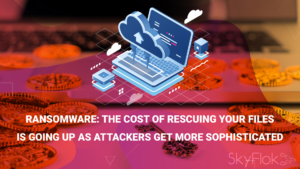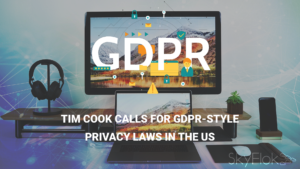“We live in the chapter of computing when data is mostly unprotected because of corporate indifference. The leaders of our new economy value convenience and short-term gratification over the security and privacy of consumer, employee and corporate data.”
Do not put your business’ reputation at risk and protect your most valuable asset – your customers’ data with SkyFlok!
SkyFlok is encrypted and designed to help businesses store files privately across the globe. It has the unique ability to let customers determine where their data is stored which helps them comply with privacy regulations.
Subscribe today and start storing and sharing files securely with your clients and colleagues!
Joel Wallenstrom is president and chief executive of Wickr, a secure communications company. Before Wickr, Joel co-founded iSEC Partners, one of the world’s leading information security research teams, later acquired by NCC Group, and served as Director for Strategic Alliances at @stake, one of the very first computer security companies in the industry.
The “below the belt selfie” media circus surrounding Jeff Bezos has made encrypted communications top of mind among nervous executive handlers. Their assumption is that a product with serious cryptography like Wickr — where I work — or Signal could have helped help Mr. Bezos and Amazon avoid this drama.
It’s a good assumption, but a troubling conclusion.
I worry that moments like these will drag serious cryptography down to the level of the National Enquirer. I’m concerned that this media cycle may lead people to view privacy and cryptography as a safety net for billionaires rather than a transformative solution for data minimization and privacy.
We live in the chapter of computing when data is mostly unprotected because of corporate indifference. The leaders of our new economy — like the vast majority of society — value convenience and short-term gratification over the security and privacy of consumer, employee and corporate data.
We cannot let this media cycle pass without recognizing that when corporate executives take a laissez-faire approach to digital privacy, their employees and organizations will follow suit.
Two recent examples illustrate the privacy indifference of our leaders:
- The most powerful executive in the world is either indifferent to, or unaware that, unencrypted online flirtations would be accessed by nation states and competitors.
- 2016 presidential campaigns were either indifferent to, or unaware that unencrypted online communications detailing “off-the-record” correspondence with media and payments to adult actor(s) would be accessed by nation states and competitors.If our leaders do not respect and understand online security and privacy, then their organizations will not make data protection a priority. It’s no surprise that we see a constant stream of large corporations and federal agencies breached by nation states and competitors. Who then can we look to for leadership?GDPR is an early attempt by regulators to lead. The European Union enacted GDPR to ensure individuals own their data and enforce penalties on companies who do not protect personal data. It applies to all data processors, but the EU is clearly focused on sending a message to the large U.S. based data processors — Amazon, Facebook, Google, Microsoft, etc. In January, France’s National Data Protection Commission sent a message by fining Google $57 million for breaching GDPR rules. It was an unprecedented fine that garnered international attention. However, we must remember that in 2018 Google’s revenues were greater than $300 million … per day! GDPR is, at best, an annoying speed-bump in the monetization strategy of large data processors.
It is through this lens that Senator Ron Wyden’s (Oregon) idealistic call for billions of dollars in corporate fines and jail time for executives who enable privacy breaches can be seen as reasonable. When record financial penalties are inconsequential it is logical to pursue other avenues to protect our data.
Real change will come when our leaders understand that data privacy and security can increase profitability and reliability. For example, the Compliance, Governance and Oversight Council reports that an enterprise will spend as much as $50 million to protect 10 petabytes of data, and that $34.5 million of this is spent on protecting data that should be deleted. Serious efficiencies are waiting to be realized and serious cryptography can help.
So, thank you Mr. Bezos for igniting corporate interest in secure communications. Let’s hope this news cycle convinces our corporate leaders and elected officials to embrace data privacy, protection and minimization because it responsible, profitable and efficient. We need leaders and elected officials to set an example and respect their own data and privacy if we have any hope of their organizations to protect ours.







